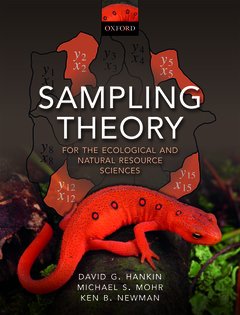Sampling Theory For the Ecological and Natural Resource Sciences
Langue : Anglais
Auteurs : Hankin David G., Mohr Michael S., Newman Kenneth B.

Sampling theory considers how methods for selection of a subset of units from a finite population (a sample) affect the accuracy of estimates of descriptive population parameters (mean, total, proportion). Although a sound knowledge of sampling theory principles would seem essential for ecologists and natural resource scientists, the subject tends to be somewhat overlooked in contrast to other core statistical topics such as regression analysis, experimental design, and multivariate statistics. This introductory text aims to redress this imbalance by specifically targeting ecologists and resource scientists, and illustrating how sampling theory can be applied in a wide variety of resource contexts. The emphasis throughout is on design-based sampling from finite populations, but some attention is given to model-based prediction and sampling from infinite populations. Sampling Theory is an introductory textbook suitable for advanced undergraduates, graduate students, professional researchers, and practitioners in the fields of ecology, evolution, conservation biology, and natural resource sciences (including fisheries, wildlife, rangeland, ecology and forestry).
David G. Hankin is a quantitative fisheries scientist who held a faculty position in the Department of Fisheries Biology at Humboldt State University (HSU) from 1978-2014. He holds a PhD in Fisheries Science from Cornell University. Over his long academic career at HSU, he taught introductory courses on fish population dynamics and sampling theory to audiences of senior and MS-level graduate students from natural resource and biological sciences. His fisheries research has focused on population dynamics and management of commercially important species, specifically Dungeness crab and Chinook salmon, with a special interest in life history and fishery inferences based on analysis of code wire tag recovery data. He has actively participated in the fishery management process, serving as a member of the Scientific and Statistical Committee of the Pacific Fisheries Management Council (1987-1992) and as a US member of the Committee on Scientific Cooperation (2001-2015). Michael S. Mohr is Supervisory Mathematical Statistician and Fisheries Assessment Program Leader for NOAA Fisheries, Southwest Fisheries Science Center, Fisheries Ecology Division, and a Research Fellow at the Institute of Marine Sciences, University of California, Santa Cruz. He holds a Bachelor of Arts degree in Mathematics and a Master of Science degree in Fisheries Science from Humboldt State University and received post-graduate training in Statistics at the University of California, Berkeley. He has over 30 years of experience in quantitative population assessment, applying sampling theory to resource management problems, and developing statistical methods and estimators. Ken B. Newman is principal researcher in statistical methodology for Biomathematics & Statistics Scotland and reader in the School of Mathematics, University of Edinburgh. He has a PhD in statistics from the University of Washington. From 1993 through 2003 he was on the faculty of the Division of Statistics at the University of Ida
Date de parution : 10-2019
Ouvrage de 360 p.
18.8x24.5 cm
Date de parution : 10-2019
Ouvrage de 360 p.
19.5x25.2 cm
© 2024 LAVOISIER S.A.S.



